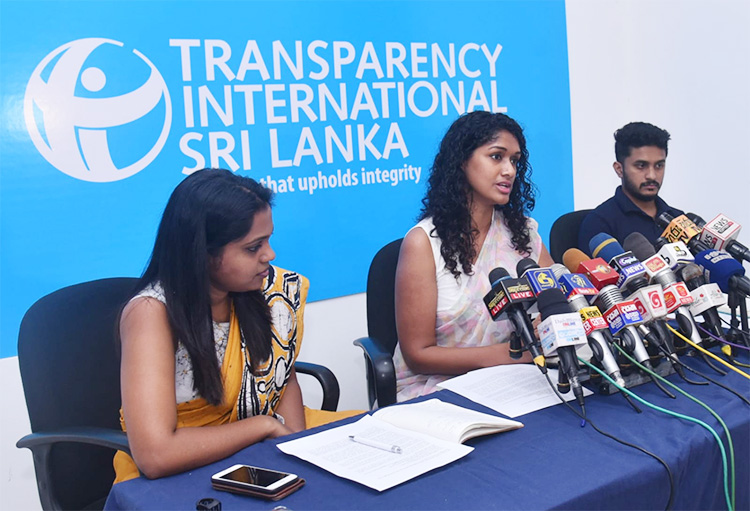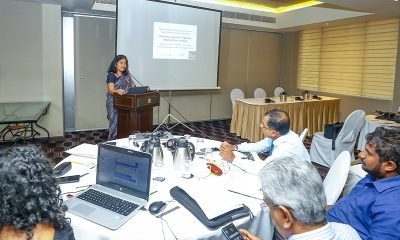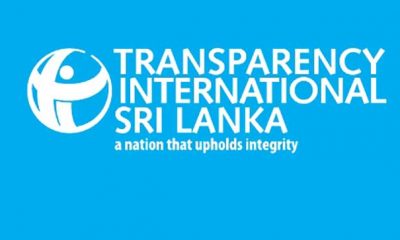News
TISL welcomes Anti-Corruption Bill, but flags two major concerns

The proposed Anti-Corruption Bill contained several laudable provisions that seek to improve upon the existing anti-corruption legal framework in Sri Lanka, TISL, Deputy Executive Director Sankhitha Gunaratne said addressing a press conference held at its office in Nawala, Rajagiriya yesterday (11).
The proposed Anti-Corruption Bill, which seeks to replace the Bribery Act (Chapter 26), the Commission to Investigate Allegations of Bribery or Corruption Act No. 19 of 1994, and the Declaration of Assets and Liabilities law No. 1 of 1975, has been gazetted and is expected to be tabled in the Parliament soon. This Bill was open for observations from different stakeholders including TISL and other civil society organizations, activists, and the public.
“Specifically recognising sexual favours as a form of gratification, including private sector corruption, and corruption offences related to sporting events within its ambit, are important changes introduced in this Bill. The Bill also significantly increases fines that can be imposed for offences,” she highlighted.
She said: “Notably, some of the changes to the Declaration of Assets and Liabilities Law that anti-corruption activists including TISL have been advocating for a few years, have now been incorporated into this Bill. In the proposed asset declaration system, there will be a central authority (CIABOC – the Commission to Investigate Allegations of Bribery or Corruption) with which all the declarations of assets and liabilities will be filed. The asset declarations will be made publicly available through an electronic system, subject to the redaction of certain sensitive information. This electronic system will identify red flags regarding the illicit enrichment of the individuals to whom this law applies. The proposed law also requires the President to file their declaration of assets and liabilities, unlike the current law.
However, TISL notes two serious concerns in the proposed law. It seeks to override all other written law, which includes the Right to Information Act. The proposed law contains sections that require officials of the CIABOC to sign oaths of secrecy and therefore, the disclosure of information by CIABOC under the new law will only be possible with special permission from the Commission. As such, the proposed law promotes a culture of secrecy by making access to information from the CIABOC more difficult and thereby negates the objective to “enhance transparency in governance,” as stated in the Bill.
TISL also notes that Section 119 of the Bill, which refers to false allegations, appears to send a negative signal to citizens willing to come forward as informants and whistleblowers to report corruption. While the similar provision in the current law has not been misused targeting corruption fighters, this particular provision could become seriously counterproductive and dangerous in a context of a politically influenced public service, or in an adverse environment of stifled civic space, democratic deficits, weak governance or kleptocracy. As an organization that advocates for citizens’ freedom of expression, TISL believes that the proposed Bill should be more robust and progressive enough to encourage whistleblowers and citizens to come forward and report corruption without fear of repercussions, while discouraging the corrupt.
TISL further emphatically highlights that the law itself, on paper, cannot create solve the plague of systemic corruption in Sri Lanka since the effectiveness of the law will entirely depend on its enforcement. For instance, the Bill provides for joint investigations and international co-operation, which will have no impact unless this is practically implemented. Under this Bill, the CIABOC is granted immense police powers, which provides adequate space for CIABOC to carry out its functions. TISL reiterates that the successful implementation of those functions depends on the level of independence the Commission is given, starting with the appointment of the Commission and the Director-General, the creation of an enabling environment where the commission and law enforcement officials are able to act without undue influence and intimidation, availability of resources including human resources, financial independence, and knowledge capacity. The mere passage of this Bill, despite its progressive portions, will not be able to address the issue of corruption in Sri Lanka until there is the political will to lead the country by example, a system change that includes a cultural shift where the people resist corruption even at the petty level, and a context that is conducive to the whistleblowers.
Therefore, TISL calls upon the government, with the technical assistance of the International Monetary Fund (IMF) to rectify these concerns in the law forthwith, and further, to continue to engage with citizens, experts, and civil society, in order to adopt a holistic approach to achieve the envisaged goal of eradicating corruption in Sri Lanka.
TISL Advocacy and Research Manager Janithrika Jayasundara, TISL Legal Officer – Community Sector Piumi Madushani and TISL Programme Officer-Communication Rifdhi Nawas also addressed the press.
News
US sports envoys to Lanka to champion youth development

The U.S. Embassy in Colombo welcomed the U.S. Sports Envoys to Sri Lanka, former National Basketball Association (NBA) and Women’s National Basketball Association (WNBA) players Stephen Howard and Astou Ndiaye, from June 8 through 14.
The Public Diplomacy section of the U.S. Embassy said that it would launch a weeklong basketball program intended to harness the unifying power of sports, made possible through collaboration with Foundation of Goodness and IImpact Hoop Lab.
While in Sri Lanka, Howard and Ndiaye, both retired professional basketball players, will conduct a weeklong program, Hoops for Hope: Bridging Borders through Basketball. The Sports Envoys will lead basketball clinics and exhibition matches and engage in leadership sessions in Colombo and Southern Province for youth aged 14-18 from Northern, Uva, Eastern and Western Provinces, offering skills and leadership training both on and off the court. The U.S. Envoys will also share their expertise with the Sri Lanka Basketball Federation, national coaches, and players, furthering the development of basketball in the country. Beyond the clinics, they will collaborate with Sri Lankan schoolchildren to take part in a community service project in the Colombo area.
“We are so proud to welcome Stephen and Astou as our Sports Envoys to Sri Lanka, to build on the strong people-to-people connections between the United States and Sri Lanka,” said U.S. Ambassador Julie Chung. “The lessons that will be shared by our Sports Envoys – communication, teamwork, resilience, inclusion, and conflict resolution – are essential for leadership development, community building, equality, and peace. The U.S. Sports Envoy program is a testament to our belief that sports can be a powerful tool in promoting peace and unity.”
News
Rahuman questions sudden cancellation of leave of CEB employees

SJB Colombo District MP Mujibur Rahuman in parliament demanded to know from the government the reasons for CEB suspending the leave of all its employees until further notice from Thursday.
MP Rahuman said that the CEB has got an acting General Manager anew and the latter yesterday morning issued a circular suspending leave of all CEB employees with immediate effect until further notice.
“We demand that Minister Kanchana Wijesekera should explain this to the House. This circular was issued while this debate on the new Electricity Amendment Bill was pending. There are many who oppose this Bill. The Minister must tell parliament the reason for the urge to cancel the leave of CEB employees,” the MP said.However, Speaker Mahinda Yapa Abeywardena prevented Minister Wijesekera responding to the query and said that the matter raised by MP Rahuman was not relevant.
News
CIPM successfully concludes 8th Annual Symposium

The Chartered Institute of Personnel Management (CIPM) successfully concluded the 8th Annual CIPM Symposium, which took place on 31st May 2024. Themed “Nurturing the Human Element—Redefining HRM in a Rapidly Changing World,” the symposium underscored the pivotal role of human resource management (HRM) in today’s dynamic global landscape. Since its inception in 1959, CIPM has been dedicated to advancing the HR profession through education, professional development, and advocacy, solidifying its position as Sri Lanka’s leading professional body for HRM.
Ken Vijayakumar, the President of the CIPM, graced the occasion as the chief guest. The symposium commenced with the welcome address by the Chairperson, Prof. Arosha Adikaram, followed by the Web Launch of the Symposium Proceedings and Abstract Book by the CIPM President. The event featured distinguished addresses, including a speech by Chief Guest Ken Vijayakumar, President of CIPM, and an address by Guest of Honor Shakthi Ranatunga, Chief Operating Officer of MAS Holdings Pvt. Ltd., Sri Lanka.
The symposium also featured an inspiring keynote address by Prof. Mario Fernando, Professor of Management and Director of the Centre for Cross Cultural Management (CCCM) at the University of Wollongong, Australia.
Vote of Thanks of the inauguration session was delivered by Dr. Dillanjani Weeratunga, Symposium Co-chair.
The symposium served as a comprehensive platform for researchers to present their findings across a wide range of critical topics in HRM. These included Cultural Diversity and Inclusion, Talent Development and Retention, Ethical Leadership and Corporate Social Responsibility, Adapting to Technological Advancements, Mental Health and Well-being at Work, Global Workforce Challenges, Employee Empowerment, and Reskilling and Upskilling.
The plenary session was led by Prof. Wasantha Rajapakse. Certificates were awarded to the best paper presenters during the valedictory session, followed by a vote of thanks delivered by Kamani Perera, Manager of Research and Development.
The annual symposium of CIPM was a truly inclusive event, attracting a diverse audience that spanned undergraduates, graduates, working professionals, research scholars and lecturers. This widespread interest highlights the symposium’s significance in the field of HRM, offering a unique opportunity for everyone to network and learn from scholarly brains.The CIPM International Research Symposium was sponsored by Hambantota International Port, Sri Lanka Institute of Information Technology (SLIIT), E B Creasy & Co. PLC, and Print Xcel Company.
























